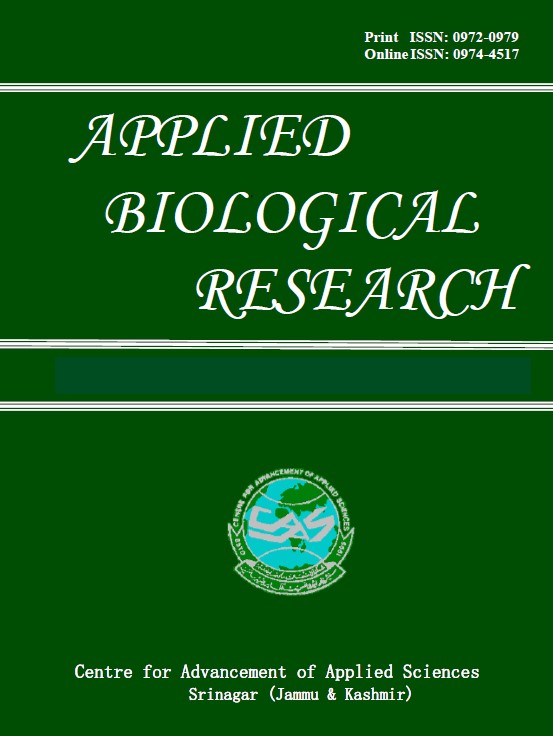Ethnomedical Use Of Calotropis Procera (Aiton) Dryand. In Kaduna State Of Nigeria And Biological Evaluation
Keywords:
Antioxidants, antimicrobial, Calotropis procera, respondents, traditional knowledgeAbstract
The development of current healthcare system is greatly influenced by plants having therapeutic potential, especially the medicinal plants. The advent of new ailments worldwide has encouraged the researchers to explore the potential of different plant parts as well. The research aims to compile information on Calotropis procera traditional usage and biological activity from a native population in the northern Nigeria, Kaduna state. Random sampling was employed for the collection of traditional medicinal knowledge on C. procera. Radical scavenging activity, ferric reducing antioxidant power, and disk diffusion assay was employed to evaluate its biological activity of ethanol and aqueous extracts of C. procera. The study revealed that C. procera is traditionally used in the area to treat a variety of ailments like hypertension, migraine, and spiritual problems having the highest fidelity at 0.9%. The leaves exhibited highest radical scavenging, ferric reducing power, and antibacterial activity at 86.01 µg ML-1 and 18.1 mmol g-1. The largest zone of inhibition against Pseudomonas aeruginosa was found in an ethanol leaf extract of C. procera at 23.5 mm. The study revealed the leaf of C. procera as a good avenue for the development of modern drugs.
Downloads
References
Abdulrahman, M. 2021. Antioxidant, alpha glucosidase and antibacterial evaluation of Syzygium mytifolium (Roxb.) Walp. Plant Science Today, 8(2): 410–415.
Abdulrahman, M.D., Ali, A., Fatihah, H., Khandaker, M. and Mat, N. 2019. In vitro biological investigations on Syzygium polyanthum cultivars. International Journal of Agriculture and Biology, 22(6): 1399-1406.
Abdulrahman, M.D., Ali, A.M., Fatihah, H., Khandaker, M.M. and Mat, N. 2018. Traditional medicinal knowledge of Malays in Terengganu, Peninsular Malaysia. Malayan Nature Journal, 70(3): 349-364.
Abdulrahman, M.D., Bradosty, S.W., Hamad, S.W., Ibrahim, M. T., Lema, A.A., Sunusi, N. and Wada, N. 2022. Traditional Methods for treatment and management of measles in Northern Nigeria: Medicinal plants and their molecular docking. Ethnobotany Research and Applications, 23: 1-18.
Abo, K., Fred-Jaiyesimi, A. and Jaiyesimi, A. 2008. Ethnobotanical studies of medicinal plants used in the management of diabetes mellitus in South Western Nigeria. Journal of Ethnopharmacology, 11I5(1): 67-71.
Dogara, A., Labaran, I., Hamad, S.W., Lema, A.A. and Jakada, B.H. 2021. Traditional medicinal plants used for the treatment of cancer in Mubi, Adamawa State, Nigeria. Al-Qadisiyah Journal of Pure Science, 26(4): 258-268.
Dudonne, S., Vitrac, X., Coutiere, P., Woillez, M. and Mérillon, J.M. 2009. Comparative study of antioxidant properties and total phenolic content of 30 plant extracts of industrial interest using DPPH, ABTS, FRAP, SOD, and ORAC assays. Journal of Agricultural and Food Chemistry, 57(5): 1768-1774.
Ijaz, F., Iqbal, Z., Rahman, I.U., Alam, J., Khan, S.M., Shah, G.M., Afzal, A. 2016. Investigation of traditional medicinal floral knowledge of Sarban hills, Abbottabad, KP, Pakistan. Journal of Ethnopharmacology, 179: 208-233.
Jamalova, D.N., Gad, H.A., Akramov, D.K., Tojibaev, K.S., Musayeib, N.M.A., Ashour, M.L. and Mamadalieva, N.Z. 2021. Discrimination of the essential oils obtained from four apiaceae species using multivariate analysis based on the chemical compositions and their biological activity. Plants, 10(8): 1529. [10.3390/plants10081529].
Jeruto, P., Lukhoba, C., Ouma, G., Otieno, D. and Mutai, C. 2008. An ethnobotanical study of medicinal plants used by the Nandi people in Kenya. Journal of Ethnopharmacology, 116(2): 370-376.
Kankara, S.S., Nuhu, A.I., Bindawa, K.A., Haruna, M.R.U., Bello, A. and Abubakar, I.B. 2022. Indigenous traditional knowledge of medicinal plants used for the management of hiv/aids opportunistic infectionsin Katsina state, Nigeria. Ethnobotany Research &Applications 23: 1-17.
Kayfi, S. and Abdulrahman, M.D. 2021. Ethnopharmacology of plants in choman, the kurdistan region of Iraq. Applied Biological Research, 23(4): 322-330.
Kinda, P.T., Nacoulma, A.P., Guenné, S., Compaoré, M., Djandé, A., Lagnika, L. and Kiendrébéogo, M. 2020. The metabolomic study of Calotropis procera Ait. from Burkina Faso, based on chemical functional groups profiling using FTIR. Journal of Complementary and Integrative Medicine, 17(3): 10.1515/jcim-2019-0134.
Kumar, V.L., Verma, S. and Das, P. 2022. Anti-inflammatory and antioxidant effect of methanol extract of latex of Calotropis procera in rat model of colorectal cancer. Journal of Ethnopharmacology, 296: 115503. [10.1016/j.jep.2022.115503].
Mahmoud, A.D., Fatihah, H.N.N., Khandaker, M.M., Ali, A.M. and Mat, N. 2020. Ethnobotany of Syzygium polyanthum (Wight) Walp in Terengganu, Peninsular Malaysia. Journal Of Agrobiotechnology, 11(2): 39-47.
Merouane, A., Fellag, S., Touaibia, M. and Beldi, A. 2022. A ethnobotanical survey of medicinal plants consumed during holy month of Ramadan in Chlef region, Algeria. Ethnobotany Research and Applications, 23: 1-14.
Rani, R., Sharma, D., Chaturvedi, M. and Yadav, J.P. 2019. Phytochemical analysis, antibacterial and antioxidant activity of Calotropis procera and Calotropis gigantea. The Natural Products Journal, 9(1): 47-60.
Sultana, B., Anwar, F. and Ashraf, M. 2009. Effect of extraction solvent/technique on the antioxidant activity of selected medicinal plant extracts. Molecules, 14(6): 2167-2180.
Umarkar, A.R., Bavaskar, S.R., Bagad, Y.M., Barhate, S.D., Jadhav, R. and Makwana, A. 2011. Calotropis procera (AIT): A phytopharmacological review. Research Journal of Pharmacognosy and Phytochemistry, 3(6): 256-260.
Yunusa, A.K., Rashid, Z.M., Mat, N., Bakar, C.A.A. and Ali, A.M. 2018. Chemicals and bioactivity discrimination of syconia of seven varieties of ficus deltoidea jack via atr-ir spectroscopic-based metabolomics. Pharmacog Journal 10(6): 147-151.
Yunusa, A.K, Dandago, M.A., Ibrahim S.A.M, Abdullahi, N., Rilwan, A. and Barde A. 2018. Total phenolic content and antioxidant capacity of different parts of cucumber (Cucumis sativus L.). Acta Universitatis Cinbinesis, Series E: Food Technology 22(2): 13-20.

